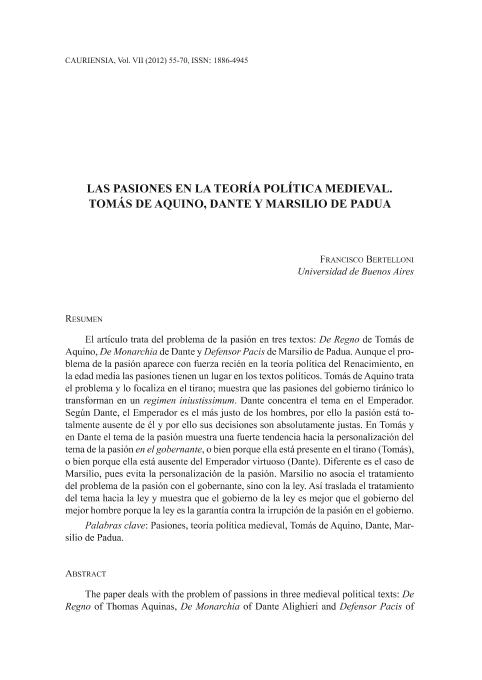Mostrar el registro sencillo del ítem
dc.contributor.author
Bertelloni, Carlos Francisco

dc.date.available
2023-05-10T13:30:11Z
dc.date.issued
2012-08
dc.identifier.citation
Bertelloni, Carlos Francisco; Las pasiones en la teoría política medieval: Tomás de Aquino, Dante y Marsilio de Padua; Universidad de Extremadura; Cauriensia; 7; 8-2012; 55-70
dc.identifier.issn
1886-4945
dc.identifier.uri
http://hdl.handle.net/11336/196958
dc.description.abstract
El artículo trata del problema de la pasión en tres textos: De Regno de Tomás de Aquino, De Monarchia de Dante y Defensor Pacis de Marsilio de Padua. Aunque el problema de la pasión aparece con fuerza recién en la teoría política del Renacimiento, en la edad media las pasiones tienen un lugar en los textos políticos. Tomás de Aquino trata el problema y lo focaliza en el tirano; muestra que las pasiones del gobierno tiránico lo transforman en un regimen iniustissimum. Dante concentra el tema en el Emperador. Según Dante, el Emperador es el más justo de los hombres, por ello la pasión está totalmente ausente de él y por ello sus decisiones son absolutamente justas. En Tomás y en Dante el tema de la pasión muestra una fuerte tendencia hacia la personalización del tema de la pasión en el gobernante, o bien porque ella está presente en el tirano (Tomás), o bien porque ella está ausente del Emperador virtuoso (Dante). Diferente es el caso de Marsilio, pues evita la personalización de la pasión. Marsilio no asocia el tratamiento del problema de la pasión con el gobernante, sino con la ley. Así traslada el tratamiento del tema hacia la ley y muestra que el gobierno de la ley es mejor que el gobierno del mejor hombre porque la ley es la garantía contra la irrupción de la pasión en el gobierno.
dc.description.abstract
The paper deals with the problem of passions in three medieval political texts: De Regno of Thomas Aquinas, De Monarchia of Dante Alighieri and Defensor Pacis of Marsilius of Padua. Although the problem of passion intensively appears only in the political theory of the Renaissance, in the Middle Ages the passions have a place in political texts. Thomas Aquinas focuses the problem on the tyrant; he shows that the passions of the tyrannical government make it an regimen iniustissimum. Dante focuses the passions on the Emperor. According to Dante, the Emperor is the justest of men, so the passion is totally absent from him and therefore his decisions (laws) are absolutely just. According to Thomas and Dante the theme of passion shows a strong trend towards the personalization of passion in the ruler, or because the passion is present in the tyrant (Thomas), or because it is absent from the virtuous Emperor (Dante). On the contrary, Marsilius moves away from the identification of passions with the ruler; he associates the passion with the law. Marsilius moves towards addressing the subject of passion in association with the law and shows that the rule of law is better than the rule of the best man for the law is a guarantee against the outbreak of passion in the government.
dc.format
application/pdf
dc.language.iso
spa
dc.publisher
Universidad de Extremadura
dc.rights
info:eu-repo/semantics/openAccess
dc.rights.uri
https://creativecommons.org/licenses/by/2.5/ar/
dc.subject
PASIONES
dc.subject
TEORÍA POLÍTICA
dc.subject
TOMAS DE AQUINO
dc.subject
DANTE
dc.subject
MARSILLO
dc.subject.classification
Otras Filosofía, Étnica y Religión

dc.subject.classification
Filosofía, Ética y Religión

dc.subject.classification
HUMANIDADES

dc.title
Las pasiones en la teoría política medieval: Tomás de Aquino, Dante y Marsilio de Padua
dc.type
info:eu-repo/semantics/article
dc.type
info:ar-repo/semantics/artículo
dc.type
info:eu-repo/semantics/publishedVersion
dc.date.updated
2023-05-09T14:55:27Z
dc.journal.volume
7
dc.journal.pagination
55-70
dc.journal.pais
España

dc.journal.ciudad
Caceres
dc.description.fil
Fil: Bertelloni, Carlos Francisco. Consejo Nacional de Investigaciones Científicas y Técnicas; Argentina. Universidad de Buenos Aires; Argentina
dc.journal.title
Cauriensia
dc.relation.alternativeid
info:eu-repo/semantics/altIdentifier/url/https://www.cauriensia.es/index.php/cauriensia/issue/view/Vol.%20VII%20%282012%29
dc.relation.alternativeid
info:eu-repo/semantics/altIdentifier/doi/https://doi.org/10.17398/rc.v7i0
Archivos asociados
